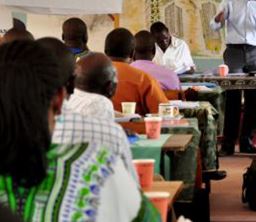Doomed to fail: Outsiders’ assessments of the impact of mining and oil projects
Community-led processes hold the key for minimizing harm and maximizing benefits.

I sat in a hot, dusty, sticky room, filled to the brim with community leaders and civil society representatives. We fanned ourselves and listened as the official spoke.
A representative of Kenya’s national environmental agency held up an impact assessment document for us to see. He claimed it had been publicly consulted and that it even included community signatures attesting to that.
A loud murmur rang out. The participants in the room were surprised and balked at what he was saying. They had no previous awareness that such a process had been conducted.
Given the reaction I observed among community members that day, I was not particularly surprised to see the Tullow Oil project temporarily halted in Kenya’s northern Turkana region in October, following community protests.
It’s a drama I’ve seen unfold again and again. Last year, long-simmering mining-related social conflicts blew up again in the southern province of Espinar in Peru. Significant problems persist with conventional or regulatory impact assessments that occur prior to oil and mining projects. Too often, they fail to adequately incorporate community participation, fail to focus on indigenous issues, are biased towards positive findings, and underestimate projects’ impact on communities.
Given my past experiences talking to communities about failed oil and mining consultation processes, I was excited to have an expert in “Community Controlled Impact Assessments” and “Impact Benefit Agreements” here in DC last month. Dr. Ciaran O’Faircheallaigh of Australia’s Griffith University spoke about how these community-led processes have been developed in terms of what works by indigenous peoples themselves, on the basis of pragmatic responses to experiences on the ground. He and I spoke at a Bank Information Center and Oxfam event. (A video recording of the full event is available here.)
“It does not matter how well-qualified your specialist impact assessment people brought in from the outside are. They do not have the local knowledge to know what is the best way to manage potentially negative impacts, and what sort of benefit maximization strategies will actually work.”
Dr. O’Faircheallaigh has found that “Community Controlled Impact Assessments” and “Impact Benefit Agreements” offer innovative ways to ensure that oil and mining project planning processes not only take into account local perspectives, but also enable communities to make critical decisions about the use of their lands and resources. To learn about “Community Controlled Impact Assessments” and “Impact Benefit Agreements,” see more information and quotes below from Dr. O’Fairchellaigh’s excellent presentation.
What is a Community Controlled Impact Assessment?
- The community develops the terms of reference for the impact assessment, and so decides the scope and focus of the assessment.
- The community selects impact assessment consultants to provide specialist input. They are accountable to the community.
- The community determines the way in which information is going to be disseminated, and determines the consultation methodology.
- There is an iterative rather than a one-shot provision of information. (Quite frequently assessments made of projects by lenders or borrowers never return to the community.)
- The community approves the draft and the final report.
- Independent peer review process occurs.
Time implications?
“Sometimes governments and project developers say, ‘We can’t do this. It will take much too long. We’ll never get the project done.’ There’s no evidence to this on the basis of the cases I’ve talked about…the Kimberly land council [in Western Australia] had submitted its impact assessment report and the proponent and the state government had still not submitted theirs. So there was actually no impact on the timeline from a project point of view.”
Cost implications?
“Towards the end of this process [the Community Controlled Impact Assessment in Kimberly] the Western Australian government…decided it didn’t like [the results of] Free, Prior and Informed Consent. It went ahead and picked a site at the very end and sought a compulsory acquisition order from the court to acquire the land compulsorily. That led to huge conflict – protests, opposition, people chaining themselves to rigs, and major delays in the process and major costs to the company.
“The lead proponent was losing $2 million a day because their rigs were tied up and couldn’t be used. Now $2 million buys you a lot of Community Controlled Impact Assessments.”
What is an Impact Benefit Agreement?
- Legally binding agreements are negotiated through indigenous communities and state authorities, and private sector developers.
- Agreements include community consent, typically to the granting of interests in land that will allow extractives or infrastructure.
- Consent is usually qualified by a requirement that it only persists as long as the other parties meet their obligations.
- They are an adaptive mechanism, and can be adapted to all sorts of situations.
“Impact Benefit Agreements are now routine in Australia and Canada. About 100 Impact Benefit Agreements were assigned in Australia in 2012 alone and they are growing quickly in developing countries.”
What’s unique?
“Impact Benefit Agreements place communities in a position to negotiate benefits and impact mitigation, not just to be consulted or to participate. That’s a fundamental shift. These emerge from a negotiation of parties, not from one party in a position of power consulting…
(paraphrasing Aboriginal leaders) “We see the Impact Benefit Agreement and our consent as the beginning of the process, not the end. It’s more about developing a relationship over the long term.”
Click here to view the full event by the Bank Information Center and Oxfam on World Bank Group safeguard policies.